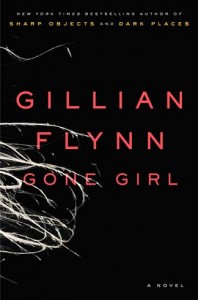 Description:
Description:
On a warm summer morning in North Carthage, Missouri, it is Nick and Amy Dunne’s fifth wedding anniversary. Presents are being wrapped and reservations are being made when Nick’s clever and beautiful wife disappears. Husband-of-the-Year Nick isn’t doing himself any favors with cringe-worthy daydreams about the slope and shape of his wife’s head, but passages from Amy’s diary reveal the alpha-girl perfectionist could have put anyone dangerously on edge. Under mounting pressure from the police and the media—as well as Amy’s fiercely doting parents—the town golden boy parades an endless series of lies, deceits, and inappropriate behavior. Nick is oddly evasive, and he’s definitely bitter—but is he really a killer?
Review:
I am one of those people who hears about a new movie generating some buzz and, instead of going to see it, thinks, “I should read the book that is based on.” And so it was that I came to read Gone Girl without actually knowing much about it. To sum up: Nick and Amy Dunne have been married for five years. They were happy at first, but things have not been going well recently. On the morning of their fifth anniversary, Amy disappears and suspicion quickly settles on Nick.
For the first half of the book, narration alternates between Nick in the present and Amy in the past (courtesy of her diary). While Nick deals with the police investigation, a steady stream of unsavory discoveries about him ensues. He has also seemingly inherited his father’s misogynist rage, even if he is better at not speaking those thoughts out loud. Amy, meanwhile, recounts how they met and the early, halcyon days of their relationship before recent entries depict her as afraid that her husband might do her harm. This segment of the novel is perhaps the strongest, as it forces readers to question whether they ought to have sympathy for Nick or not. Dislikable though he may be, some apparently damning incidents are really just due to (occasionally excruciating) ineptitude.
And then there is a big twist, which I shan’t spoil. Alas, rather than making things more interesting, it ushers in a period of boring interludes and exposes even more character flaws, of the “crass and profane” or “snivelly and petulant” varieties. Granted, no one enjoys reading about perfect people, but I usually prefer there to be at least one character to legitimately care about. Still, I carried on, but was beginning to look forward to the book simply being over already. And yet it seemingly refused to end. Something would happen and you’d think, “Okay, that’s the revelation that wraps everything up.” But then it wouldn’t be! It would just keep going.
True, the final twist was something that, although the clues were there, I failed to see coming. So kudos for that. And yet, I find I can’t really recommend the book. I suspect that the movie is much better, because the story is condensed into 149 minutes, and presumably omits Nick’s often odious inner thoughts, but I doubt I’ll ever feel the urge to watch it. I must, however, award some points for the reference to the classic Pace Picante Sauce commercial, as my involuntary reaction to anyone mentioning New York City is to think “New York City?!?!”




Recent Comments